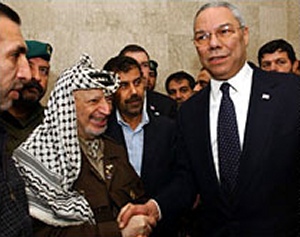| Israel has responded
with heavy air attacks against suspected Hezbollah hideouts in southern
Lebanon, threatening to open a new front in the Middle East conflict. (Full
story)
Syria and Iran have
backed Hezbollah for many years and in 2000 the group was instrumental
in forcing Israel to withdraw its troops from southern Lebanon.
Powell spent Sunday
in separate talks with Palestinian Authority President Yasser Arafat and
Israeli Prime Minister Ariel Sharon but came away with no breakthroughs.
Powell said his meeting
with Arafat was "useful and constructive." He said Arafat told him his
top concern was the "humanitarian hardships the Palestinian people are
facing" -- especially in Bethlehem and Jenin.
A senior State Department
official said Powell "sent a very clear message" that suicide bombing attacks
"had to end," adding the "continuing of the bombing was a major barrier
to moving forward" on a peace process for the Middle East.
"We exchanged a variety
of ideas and discussed steps of how we can move forward, and members of
my staff will be speaking to his staff again," Powell said. Arafat agreed
to have his aides meet Monday with U.S. Middle East envoy Anthony Zinni.
Senior Palestinian
sources said Arafat spent the first 70 minutes of the three-hour meeting
listing Palestinian claims of massacres and mass burials in Jenin.
He expressed disappointment
that Powell viewed by helicopter the aftermath of the Jerusalem suicide
bombing but had not sought to see what had happened to Palestinian civilians
in Jenin and Nablus.
The meeting took
place after Arafat and the Palestinian leadership issued a statement in
Arabic Saturday condemning violence by both sides in the Middle East conflict.
Powell originally postponed talks with Arafat after a suicide bomber killed
six people Friday in Jerusalem. (Read statement)
In Sharon's meeting
with Powell, the Israel prime minister renewed his proposal for an international
conference on the Middle East, but a senior U.S. official downplayed the
idea because Sharon would exclude Arafat.
Powell told Sharon
the United States was prepared to lead such a conference that would include
representatives from Jordan, Egypt, Saudi Arabia, Israel and the Palestinians,
according to Sharon spokesman Ra'anan Gissin.
"It's something that's
been around," said a senior State Department official. But the Bush administration
insists Sharon must deal with Arafat as the legitimately elected leader
of the Palestinians.
"That's why we're
saying we didn't particularly endorse Sharon's idea," the senior official
said.
The official said
Sharon has said in the past that Israel might attend a peace conference
with "moderate" Arab leaders. But Sharon has made clear he does not consider
Arafat to be such a leader.
Gissin said Arafat
would have to take significant steps on the ground to prove that he supports
a cease-fire before the Israeli government would consider opening talks
with him.
"We don't think he
can do it," Gissin said. "The Americans do so. We are happy to let them
try. But we don't think Arafat can do it."
Sharon and Powell
talked about "serious U.S. concerns on the humanitarian situation, particularly
in Jenin," and Powell pressed for Israel to complete its withdrawal from
the West Bank, said State Department spokesman Richard Boucher.
Gissin said the Israeli
leader gave no timetable for pulling Israeli troops out of Palestinian
territory.
Israeli troops began
their incursion into the West Bank on March 29, confining Arafat to his
headquarters in Ramallah and sealing off Palestinian towns in an attempt
to destroy what Israel calls "the Palestinian terrorist infrastructure."
Latest developments
Palestinian sources
said Sunday that the Israel Defense Forces had sent troops into the village
of Tamoun, near Jenin. The IDF refused comment.
U.S. Deputy Secretary
of State Richard Armitage urged Israel to allow humanitarian organizations
to enter the Jenin camp, where food, water and medical aid are in short
supply.
Israel Radio reported
the head of the IDF general staff, Gen. Saul Mofaz, told an Israeli Cabinet
meeting 5,000 Palestinians had been arrested during the operation. He said
50 were on Israel's most wanted list and 1,200 had "blood on their hands.
The IDF said Sunday
it would soon declare an end of its closed military zone in the West Bank,
except for three hot spots: the Jenin refugee camp, Arafat's compound at
Ramallah, and the Church of the Nativity in Bethlehem.
The Israeli Supreme
Court threw out a case Sunday that sought to bar the IDF from burying Palestinian
victims at the Jenin refugee camp. (Full story)
The Israeli government
has offered to allow 200 Palestinians holed up in the Church of the Nativity
in Bethlehem the choice of standing trial in Israel or accepting exile
for life, an Israeli government spokesman said Sunday. Palestinian officials
immediately rejected the offer.
Israel Radio reported
Sharon vowed at a stormy Cabinet meeting Sunday that the killers of Israeli
Tourism Minister Rehavam Zeevi would be brought to trial. The report said
Sharon claimed the killers are with Arafat in his compound and he vowed
to use the military to get them if necessary despite strong objections
from Foreign Minister Shimon Peres. Zeevi was killed in October 2001.

|
